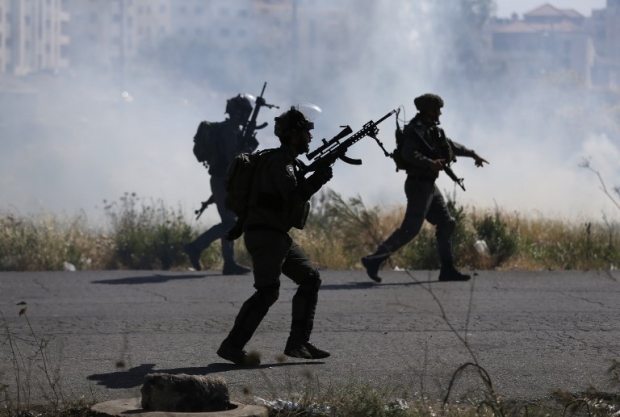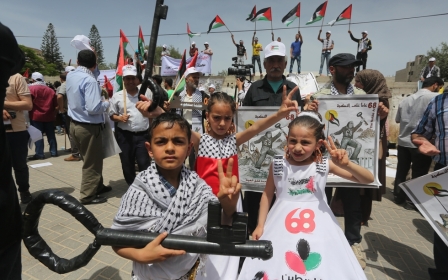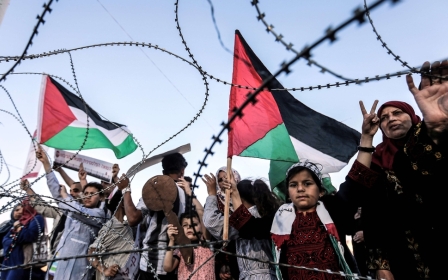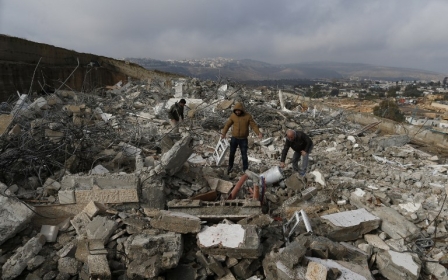How the hate of Israel's defenders brought the Nakba to Philadelphia
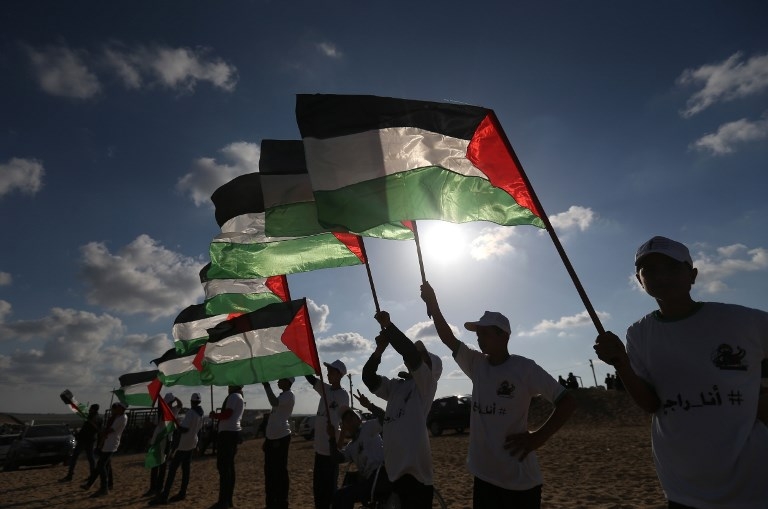
As I stood outside the Kimmel Center with a group of activists protesting the Philadelphia Orchestra's collaboration with the Israeli government late April, a little old lady pushing a walker inched towards me. I instinctively smiled at her, as one does when approached by someone vulnerable.
Then she spoke, triumphantly, taking pains to raise an arthritic finger in my face.
"I'm a Holocaust survivor and I fought in Israel against terrorists like them," she said, pointing with the same finger to a photo scroll of Palestinians recently murdered by Israeli snipers - who continue, as I write this, to put unarmed Palestinians in their crosshairs and fire, as if sports hunting.
Incomprehensible catastrophe
The incongruity of this woman's age and physical frailty with the hatefulness of her words and demeanour were difficult to reconcile. It is confounding to ponder the reality that the Palestinian Nakba occurred mostly at the hands of European Jews who survived the Holocaust.
Nakba means catastrophe in Arabic - something so devastating and on such an impossibly large scale that it is incomprehensible. Who but the perpetrators could have truly fathomed the theft of an entire country, a nation with a history and heritage spanning millennia?
Like South Africa, Algeria, and native and black America - all of whom were terrorised by centuries of colonial white supremacy - Palestine will fight its way back to life
How does one fathom the near complete erasure of Palestinians, an ancient people with built-up cities, an airport and airline, libraries, sports teams, bands, symphonies, businesses, banks, farms, places of worship, schools, universities, parks, beaches, roads and all the infrastructure of life?
And then to imagine beyond the unimaginable, to an abyss of Zionist lies and myths that reassign Palestinian culture, food, traditions, property, heritage and history as the inheritance of European Jews, who had never set foot nor had direct ancestral links to that land prior to the 20th century?
Even as every Palestinian has been shaped by the Nakba in one way or another, we remain stunned - not only by the magnitude of theft and lies and the enduring cruelty of Zionists who consistently remind the world of Jewish victimhood, but also by a modern world so eagerly willing to embrace such fantastical narratives as divinely ordained settler colonialism.
Terrorising Palestinian people
Celebrations of Palestinian demise are taking place all over the world in April and May, and at the highest levels of governments. They raise the flag of a 70-year-old invented nation of foreigners who changed their names to sound less European and who have been terrorising and robbing the indigenous Palestinian people since the day they set foot on our shores.
And I wonder, why? Why do France, the US, Canada, the UK, Germany and others raise the Israeli flag over their government buildings? Why are they indifferent to the profound anguish of a long-suffering indigenous people? What have we done to any of them to deserve such contempt?
The late James Baldwin, a prophetic moral authority and one of the greatest essayists in the English language, wrote in 1979 that “the state of Israel was not created for the salvation of the Jews; it was created for the salvation of the Western interests … The Palestinians have been paying for the British colonial policy of ‘divide and rule’ and for Europe’s guilty Christian conscience for more than thirty years.
"Finally: there is absolutely - repeat: absolutely - no hope of establishing peace in what Europe so arrogantly calls the Middle East (how in the world would Europe know having so dismally failed to find a passage to India?) without dealing with the Palestinians. The collapse of the Shah … revealed who supplied oil to Israel, and to whom Israel supplied arms. It happened to be, to spell it out, white South Africa.”
Fighting for basic human dignity
It is right to point to the close association with apartheid South Africa. In the final analysis, Israel is similarly anachronistic, a fading colonial era's final grasp to salvage the white supremacy and colonialism of old.
I think of that little old lady's venom at the protest. She came after a middle-aged man who spat on us repeatedly, a smartly dressed Israeli soldier (now living in Philadelphia) who menacingly stood over me before tearing a poster from my hands, and others who yelled slurs at us. They were wealthy white patrons of the orchestra who believe that Palestinians should lose everything so they, and Jewish people all over the planet, can have a country on our land.
Then there was us, a diverse group of Philadelphians, who fight daily against powerful financial and racist powers for the most basic of human dignities for people robbed of their resources and spirits. And, of course, there was the Philadelphia Orchestra, sophisticates who cannot be inconvenienced by the morality of an oppressed people’s struggle.
It was a microcosm of the Palestinian Nakba, an ongoing vestige of colonialism. But like South Africa, Algeria, and native and black America - all of whom were terrorised by centuries of colonial white supremacy - Palestine will fight its way back to life. Rarely has history wavered in this trajectory.
- Susan Abulhawa is a Palestinian-American writer and bestselling author. The Blue Between Sky and Water (Bloomsbury, 2015) is her most recent novel.
The views expressed in this article belong to the author and do not necessarily reflect the editorial policy of Middle East Eye.
Photo: Palestinians hold their national flag on 10 April 2018 at the site of protests on the Israel-Gaza border (AFP)
Middle East Eye propose une couverture et une analyse indépendantes et incomparables du Moyen-Orient, de l’Afrique du Nord et d’autres régions du monde. Pour en savoir plus sur la reprise de ce contenu et les frais qui s’appliquent, veuillez remplir ce formulaire [en anglais]. Pour en savoir plus sur MEE, cliquez ici [en anglais].



